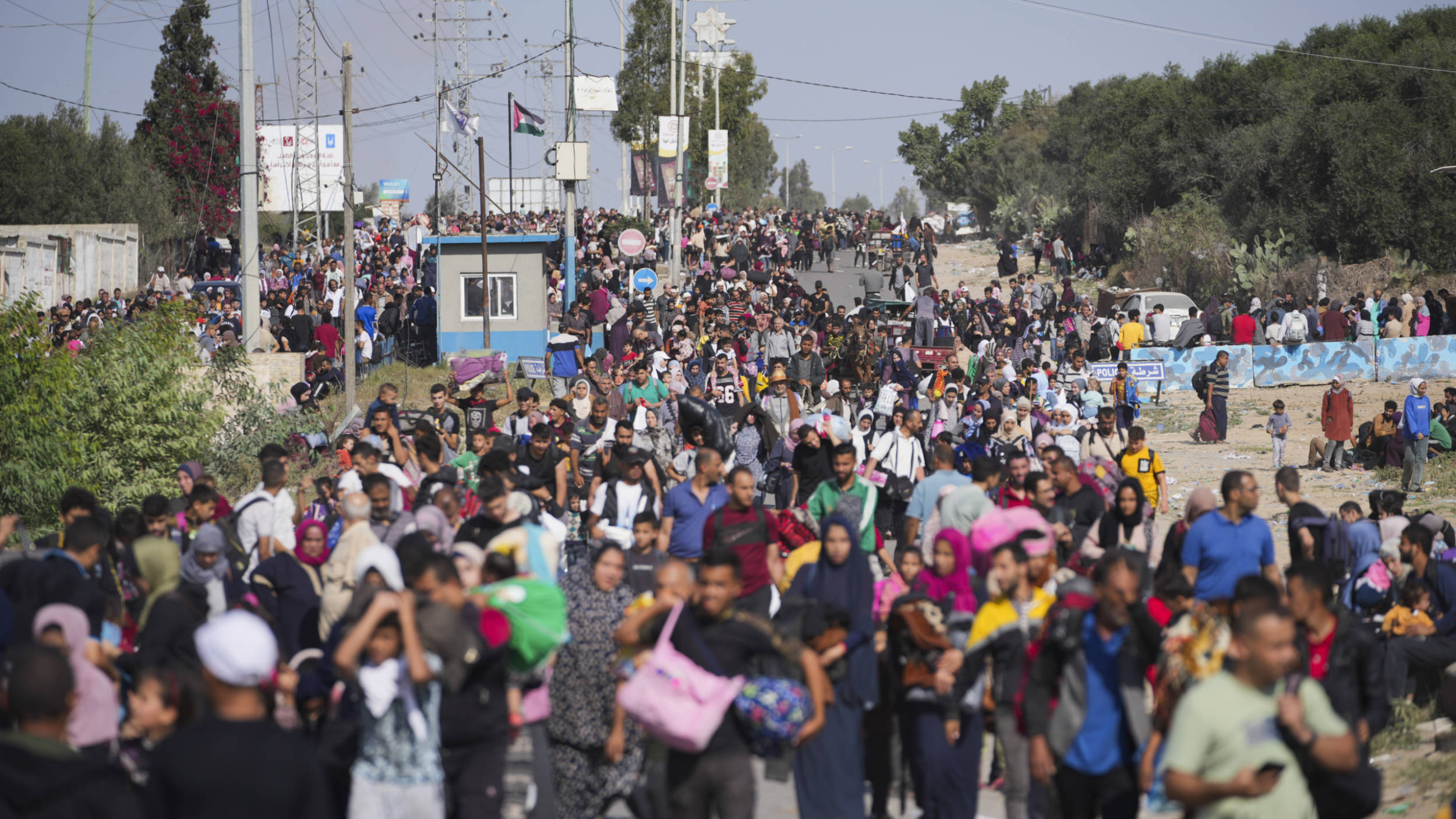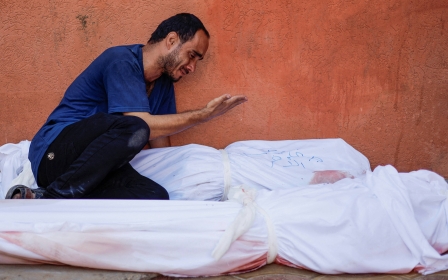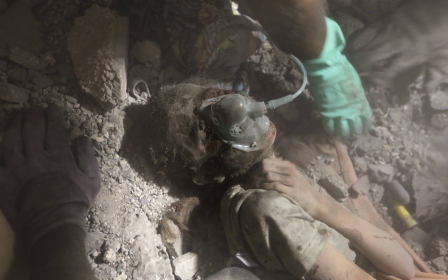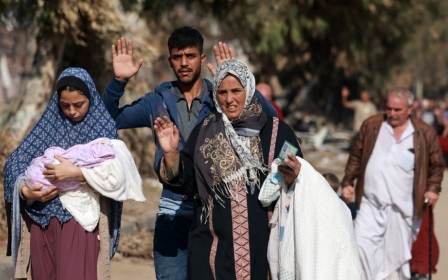Israel-Palestine war: 'We walked into the unknown, uncertain of where we were headed'
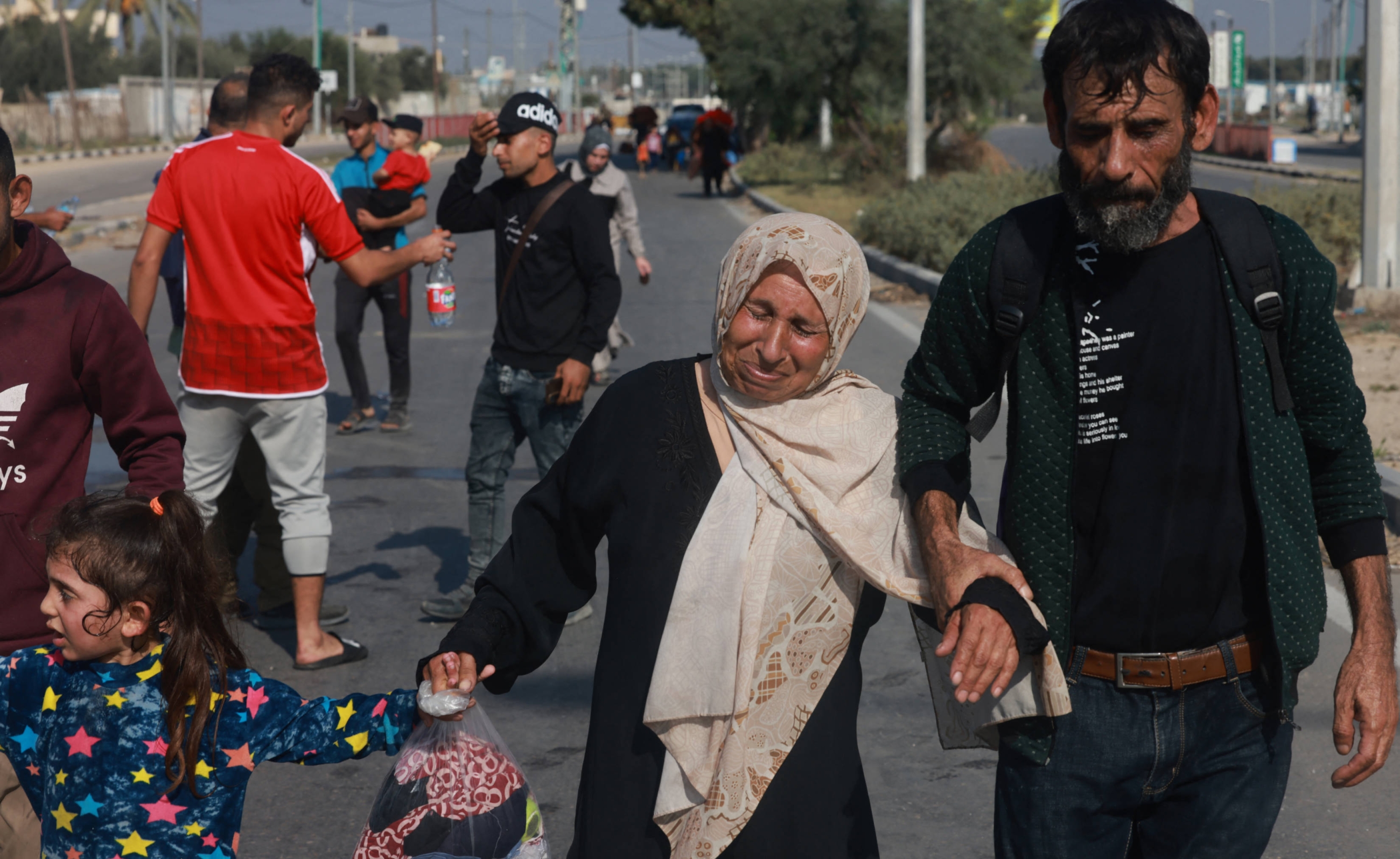
In one of the classrooms of a UN-run school in al-Maghazi refugee camp in central Gaza Strip, Shafa al-Dahshan, a 70-year-old Palestinian woman, sits on a shabby mattress, exhausted and in tears, as she recounts to Middle East Eye the harrowing journey of displacement from her home in Asqoula neighbourhood, east of Gaza city. Dahshan and her family are among 1.7 million people, around three-quarters of Gaza's population, who have been forcibly displaced since Israel launched a bombing campaign on the besieged enclave on 7 October.
This is her story as told to MEE correspondent Aseel Mousa
What we have endured since the start of the war until today cannot be adequately described in words. We are experiencing true horror - dark days, the likes of which I have never lived before.
We were huddled inside our home amid continuous, violent and terrifying bombing when the Israeli military contacted me 0n the phone, informing me that our region is a "war zone" and that we must evacuate to the south of the Gaza Strip.
I am a disabled woman, my husband is 80 years old and we are both confined to wheelchairs.
New MEE newsletter: Jerusalem Dispatch
Sign up to get the latest insights and analysis on Israel-Palestine, alongside Turkey Unpacked and other MEE newsletters
On 16 November, the Israeli bombing intensified in the area around our house. I can still hear my grandchildren and granddaughters crying and screaming.
That night, they struck our house.
I had three sons, but the Israeli military killed my son Mohammed. I also had six daughters, but they also killed my daughter Mona, her husband, their beautiful and affectionate 20-year-old daughter Raghad, who loved me very much.
The wife of my son Ahmed suffered fractures to both her legs and her face suffered third-degree burns. Ahmed took her to al-Shifa Hospital, where they inserted iron rods in her legs - and that was the last we've heard of them.
Following the attack, we fled our home to our neighbour's house, where we stayed until the next morning.
It was a harrowing night, the worst night of my life in 70 years. The Israeli army was ruthlessly bombing the homes of civilians, demolishing them on the heads of their residents, reducing them to rubble.
On 17 November, my husband, my third son, his wife, their seven children and I left. My son alternated between carrying me and his father on his back until we reached a point, a short walk away, where cars and carts drawn by donkeys were available.
We then rode in a car until the Salah al-Din road, the main route that hundreds of thousands of people from the north and west of the strip have taken to flee south.
My son then dragged me and his father in our wheelchairs, and we saw dead bodies on the road along the way, through Israel's so-called "humanitarian corridor".
I wept for them, saying, 'This is the body of my son Mohammed, and this is the body of my daughter Mona. Here lies my daughter's husband, and there is her daughter Raghad.'
We encountered Israeli soldiers. We held up our IDs as they gave us orders on where to go and which side of the road to be on. They were arresting young men, forcing some to strip down.
There was no mercy nor consideration for children or the elderly. Most of us walked into the unknown, uncertain of where we were headed.
My son then dragged me and his father in our wheelchairs, and we saw dead bodies on the road through Israel's so-called 'humanitarian corridor'
The journey of displacement is terrifying. We left our bombed homes and possessions in Gaza, fleeing to the south. Israel obliterated my memories of the home where I had lived for more than 50 years.
I haven't been able to communicate with Ahmed and his family and I know nothing of their fate after Israeli forces encircled, bombed and stormed al-Shifa Hospital.
We finally reached beyond Wadi Gaza in the south and I rode in a donkey-drawn cart for the first time in my life. It was humiliating that we couldn't even find a car to take us to al-Maghazi camp because Israel's siege has completely cut off fuel.
The situation at the Unrwa school in al-Maghazi is incredibly tragic.
There is a severe shortage of food, mattresses and blankets suitable for winter. I find myself shivering at night. This is our fifth day in the shelter, and the basic necessities of life are lacking.
My elderly husband spends his day and night in a tent in the schoolyard. Two days ago, heavy rain poured, and the tents were inundated.
The cold was unbearable, and we had not brought winter clothes or anything to shield us from the winter chill.
Middle East Eye delivers independent and unrivalled coverage and analysis of the Middle East, North Africa and beyond. To learn more about republishing this content and the associated fees, please fill out this form. More about MEE can be found here.


